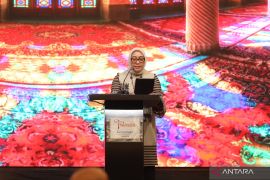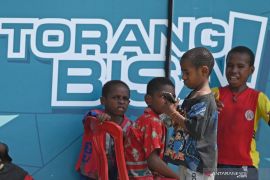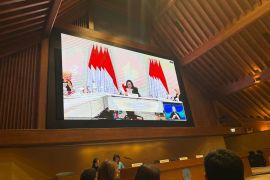Based on data from the Ministry of Health, the number of smokers aged under 18 in Indonesia increased from 7.2 percent to 8.8 percent in 2015.Jakarta (ANTARA News) - Smoking among youth can be significantly reduced by effectively enforcing prohibition of cigarette sales to children. Cigarette sales prohibition is considered an important component of comprehensive tobacco prevention campaign.
Children who smoke usually buy their cigarettes directly from a store or retailer, and therefore, publicly listed PT Hanjaya Mandala Sampoerna is assisting government programs to prevent the sale of cigarettes to children under the age of 18.
PT Sampoerna is the leading tobacco company in Indonesia, which produces some of the best-known krete (clove) cigarette brands such as Sampoerna A, Sampoerna Kretek, Sampoerna U and Dji Sam Soe.
The company is always in favor of the rules set by the government. Its target market is for adults and not children, according to Eric Chan Hee Ng, Sampoerna marketing general manager for East Java area.
Speaking to newsmen in Surabaya on Friday, Eric said prevention of cigarette sales to children is done in cooperation with many parties, especially with the trading partners, to run a program called Prevention of Access Cigarette Purchases by Children (Papra).
"Up to now, Sampoerna has recruited 32,300 trading partners throughout Indonesia, especially modern retails to run the Papra program," he remarked.
In addition to cooperation through the Papra program, Eric said Sampoerna continues to campaign that children under 18 should not be given access to buy cigarettes.
Based on data from the Ministry of Health, the number of smokers aged under 18 in Indonesia increased from 7.2 percent to 8.8 percent in 2015.
Hence, the Ministry of Health has targeted that the figure could drop to 6.4 percent in 2016 and 5.4 percent in 2019.
PT Sampoerna continues to decrease the number of child smokers, and since 2013, the company has been cooperating with retailers to get involved in the campaign to prevent the sale of cigarettes to children.
It is necessary to use a variety of programs to prevent young people from smoking, as cigarette smoke contains hazardous chemicals, including carcinogenic compounds and other toxins.
Cigarette ingredients include nicotine, tar, and carbon monoxide, as well as formaldehyde, ammonia, hydrogen cyanide and even arsenic.
In an effort to save the future generation from the toxins of tobacco, the Ministry of Health and the Tobacco Control Support Center of the Indonesian Public Health Association (TCSC-IAKMI) held the Indonesian Conference on Tobacco or Health (ICTOH) last November in Yogyakarta.
The conference brought together various parties concerned on tobacco control efforts toward making Indonesias young generation tobacco-free.
Government agencies, academics, professional organizations, community organizations, researchers, students, media and public attended the conference to study various issues on comprehensive tobacco control.
TCSC-IAKMI Chairperson Widyastuti Soerojo remarked in the conference that teenagers are the target of the tobacco industries to become their long-term consumers.
According to her, tobacco industries exploit the teenagers to become their long-term consumers, because about 70 percent of new smokers are youth under 18 years.
Widyastuti said that when teenagers stop smoking, the tobacco industries go bankrupt, and therefore, they are trying to target youth between 13 and 19 to be their potential customers.
Further, she noted that tobacco in the form of cigarette is dangerous, because it contains addictive substances and toxins, and is one of the major factors for spread of non-communicable diseases.
Another speaker in the conference, the Union Regional Asia Pacific Deputi Tara Singh Bam, remarked that tobacco is the number one killer in the world, and so necessary measures are needed to prevent young people from the dangers of smoking and to help them quit smoking.
"Tobacco kills more than 800 million men around the world. Every year, five million people worldwide, including more than 200 thousand people from Indonesia, are killed by tobacco," Tara said.
According to him, Indonesia currently does not have a strong regulation in tobacco control, making the country a good target for the tobacco industry marketing.
Indonesia is the only country in Southeast Asia that has not yet ratified or acceded to the Framework Convention on Tobacco Control (FCTC) of the World Health Organization (WHO).
Now there are 180 countries that are part of the FCTC, which jointly fights the negative effects of tobacco.
Tobacco is one of the four main risk factors behind non-communicable diseases, mostly cancers, cardiovascular and lung diseases and diabetes.
Therefore, the WHO has urged governments around the world to increase taxes on cigarettes and other tobacco products to save lives and generate funds for better health services.
According to WHO, not many governments make full use of the tobacco taxes to dissuade people and help them quit smoking.
It recommends that at least 75 percent of the price of a pack of cigarettes should be taxed.
The WHO has found that one person dies every six seconds or so from tobacco-related diseases, equivalent to some six million people a year.(*)
Reporter: Otniel Tamindael
Editor: Heru Purwanto
Copyright © ANTARA 2016











